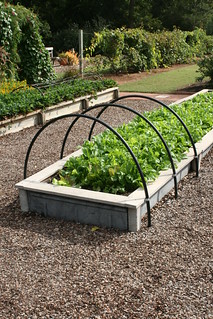If you live in an area with distinct seasons, your vegetable growing season will fall loosely between your anticipated frost-free date in the spring and the first hard frost in the fall. Unless you have a crystal ball, it is next to impossible to predict these dates with absolute certainty.
Fortunately, there are some valuable online resources you can check for general guidelines. A quick online search for “frost-free date” + your geographic area should give you a good idea of when it might be safe to plant in your region.
| Starting seeds indoors for an earlier start. (Photo credit: Wikipedia) |
As you develop your garden planting timeline, think of these two important dates as virtual “bookends” around your prime vegetable growing season. However, if you start seeds indoors or protect your plants from cold temperatures with mulch, cold frames, row covers or mini-hoop houses, you can extend your growing season even further.
Don’t Ignore “Days to Maturity” for Your Selected Plants
As you’re deciding when to plant vegetables in your garden, pay close attention the “days to maturity” information noted on the seed packages or plant markers for the vegetables you’ve selected. This number, which is often expressed as a range of days, tells you how long it will take until that plant is ready to harvest.
| Lettuce in raised beds with hoops (Photo credit: Gardening in a Minute) |
The “days to maturity” for a particular vegetable variety gives you an idea of how early you need to get that plant into the ground if you want it to reach maturity before your first hard frost date.
It also tells you how late in the season you can plant certain crops. For example, you can’t wait until late summer in northern climates to plant pumpkins seeds that require 160 days to mature. On the other hand, you can plant fast-growing lettuce varieties with confidence until 30 days or so before your expected last frost date.
Learning when to plant vegetables in your area is worth the effort. Knowing when your prime growing season begins and ends – and how you can get the most out of it – will make you a much more successful food gardener. It will help you decide which vegetables to grow and how to help those varieties thrive in your garden.
We will be on vacation next week, so will not be posting, but be sure to check back the following week when we'll share 3 important tips that vegetable gardeners need to keep in mind for a successful organic gardening experience! Have a Happy Memorial Day, and enjoy your beautiful early summer garden!



No comments:
Post a Comment